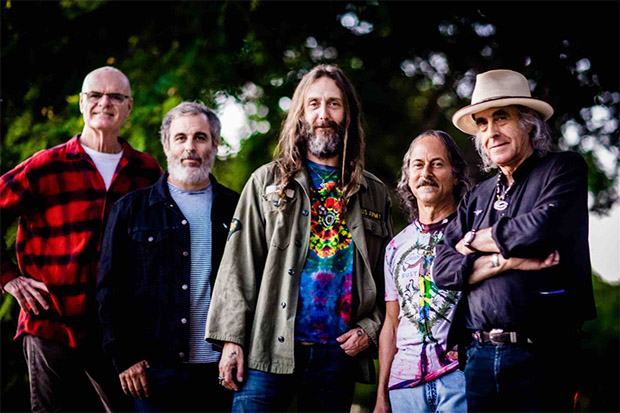Barry Sless is enjoying a few hours off. Whether it’s as a guitarist with David Nelson Band, Moonalice, Phil Lesh and Friends, or Green Leaf Rustlers, Sless remains one of the more in-demand musicians in the Marin County, California scene. On this afternoon, though, he’s just getting back on dry land after a day of boating in Hawaii during a Nelson tour stop. He’s eager to talk about From Within Marin, the new live album from Green Leaf Rustlers, recorded over several 2018 shows by the famed Grateful Dead taper, Betty Cantor-Jackson. The Rustlers, fronted by Black Crowes singer Chris Robinson, came together rather informally a few years back after Robinson gathered together Sless, drummer John Molo, guitarist Greg Loiacono, and bassist Pete Sears for a night of jamming during one of the frontman’s 2017 Hootenanny Heroes appearances at Terrapin Crossroads. While their Rustlers performances have been sporadic in nature, they’ve been memorable, including a series of shows in the days following the death of Chris Robinson Brotherhood guitarist Neal Casal. Sless spoke to us about those emotional moments, as well as detailing the mission of the Rustlers and its repertoire, and perpetuating the ‘sound of Marin.’
The From Within Marin cover art seems to suggest this is music made by cowboys on the moon.
Cool. I like that. I’d say that would be a pretty good description of what we want it to be; the country thing and the cosmic thing. The visual element relates to the auditory elements.
The album title is a literal allusion to where the record was recorded but it can be interpreted as suggestive of a ‘Marin sound.’ Do you think there is a ‘Marin sound?’
There is a spirit of improvisation alive and well within Marin. If there was anything you would call a Marin sound I would say it probably includes taking songs and stretching them out, jamming on them a bit. That’s definitely kind of where I live musically and physically. I have a lot of other influences, as well. But, a large part of my style is influenced by that improvisational style of music.
Are the improvisations inspired from an expectation the audience has based on your work in other bands, the setting, or just a general sense of freedom the music itself inspires?
A little bit of all of that. Our audience would rather hear us go out on a limb, take chances, maybe even fumble a bit here and there- not have everything be exactly right- than if we played something perfectly tight, rehearsed note-for-note every time. I think they want that spirit of adventure in the music.
Is that also what you look for when you play?
Absolutely. It’s all about the adventure.
How is your playing in Green Leaf Rustlers different from when you play in other groups?
For me, how it’s different is with the Rustlers I get a lot more opportunity to play pedal steel than in most of the other bands that I’m in. I play about 90% pedal steel in the Rustlers, and in most of the other bands it’s 90% and upwards of guitar.
And similar?
The spirit of improvisation. It allows us to take songs- whose original versions are probably three to four minutes- and stretch them. Sometimes that just means we keep going, building a solo until the soloist is done. Other times it’s breaking away from the form of the song; seeing wherever it goes; wherever the muse takes us. Not having a contrived idea of where the music is going to go. Letting it be different every time, and being loose enough, free enough to roll with that.
Was there a particular vision for what the Rustlers would be from the outset?
Chris wanted to do something local. He’d moved to Marin County a couple of years before that. The vision for it was his. Once we get our hands on it, it becomes whatever the collective- the five of us- make it. Chris gives us plenty of freedom to be ourselves. Really, that’s what it’s all about. He has a really wide, eclectic taste in music. I would consider him a musicologist. He’s definitely into that 1970s country rock thing: Gram Parsons; the Flying Burrito Brothers; The Byrds; Doug Sahm; Waylon Jennings.
Are all the song choices for the repertoire coming from Chris?
Most of it is coming from him. I’ll suggest something once in a while. Greg will bring some songs. I think Greg has one- “Groove Me”- that he sings on the record.
How does the band determine the arrangements of the songs? A lot of them are reworked from their standard versions.
Mostly it’s a Chris thing; how he wants to sing it; the groove he wants behind it. Chris illustrates the kind of feel he wants to do and the band follows suit. After he tells us the feel, the rest is up to us where we go with it. He’s wide open and free about that. He gives us a lot of freedom to interpret songs the way we want to.
I think of three examples on the record- Johnny Cash’s “Folsom Prison Blues,” the Rolling Stones’ “No Expectations,” and Bob Dylan’s “Positively 4th Street”- as being samples of contrast, both from the originals and from each other. That comes from Chris?
That was certainly the case with “Folsom Prison Blues.” It was his idea to open it up and stretch it out like that.
What about “No Expectations,” which stays fairly close to the Stones’ version?
That was the first time we ever played the song. We probably went over it in soundcheck that day and played it that night.
And Dylan is always tough to do well, without parody or straying too far.
I thought he did a great vocal performance on “Positively 4th Street.” It has such a passionate, soulful approach. He completely makes it his own.



No Comments comments associated with this post